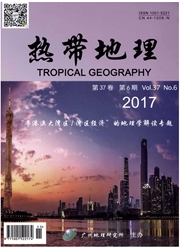

 中文摘要:
中文摘要:
基于可持续生计框架探究旅游开发对拆迁村民生计的影响。以珠海横琴富祥湾新、旧村因长隆国际海洋度假区开发搬迁村户为调查对象,采用访谈法与问卷调查法,对比分析了村民搬迁前后的生计资本、生计策略、生计结果的变化情况,并研究了生计资产→生计策略→生计后果三者的相互作用关系。研究发现:村民搬迁后生计资本和生计结果有明显改善,影响生计策略和生计结果最重要的生计资本是人力资本,其次是金融资本和社会资本。人力资本存在显著优势的村户更容易获益而具有高可持续生计能力;村户利用社会资本优势也可以维系中等程度的生计水平;那些在度假区就业的村户,普遍缺乏生计资本,其生计可持续性较低。拆迁补偿和提供就业仅是维系村民生计的最后的一道保障,引导人力资本的提高才是关键。这需要政府将针对居民的培训以及就业心理干预工作一并纳入拆迁配套政策之中。
 英文摘要:
英文摘要:
This study analyzes the impacts of a large-scale theme park-Chimelong International Ocean Tourist Resort(Chimelong) on the livelihoods of relocated residents under the framework of Sustainable Livelihood Approach(SLA).Based on the field research which combines interviewing with questionnaire methods together,this study analyzes the changes of livelihood capitals,livelihood strategies and livelihood outcomes of the relocated residents.The results find that residents' physical capital and financial capital were greatly increased,meanwhile their wellbeing and ability to resist vulnerability were also got slightly improved.Residents,who had advantages in human capital,are more likely to achieve a high level of sustainable livelihood,but they often engaged in non-agricultural and non-tourism industries.Residents who worked for the local tourist enterprises had the lowest level of livelihood because of lack of human capital and social capital.The job opportunities the Chimelong offered to local residents were often low pay with high workload,and thus can't help improve their livelihoods.The study thus advocates the government to establish effective public training programme and psychological intervene mechanism for relocated people to help them improve human capital.
 同期刊论文项目
同期刊论文项目
 同项目期刊论文
同项目期刊论文
 期刊信息
期刊信息
